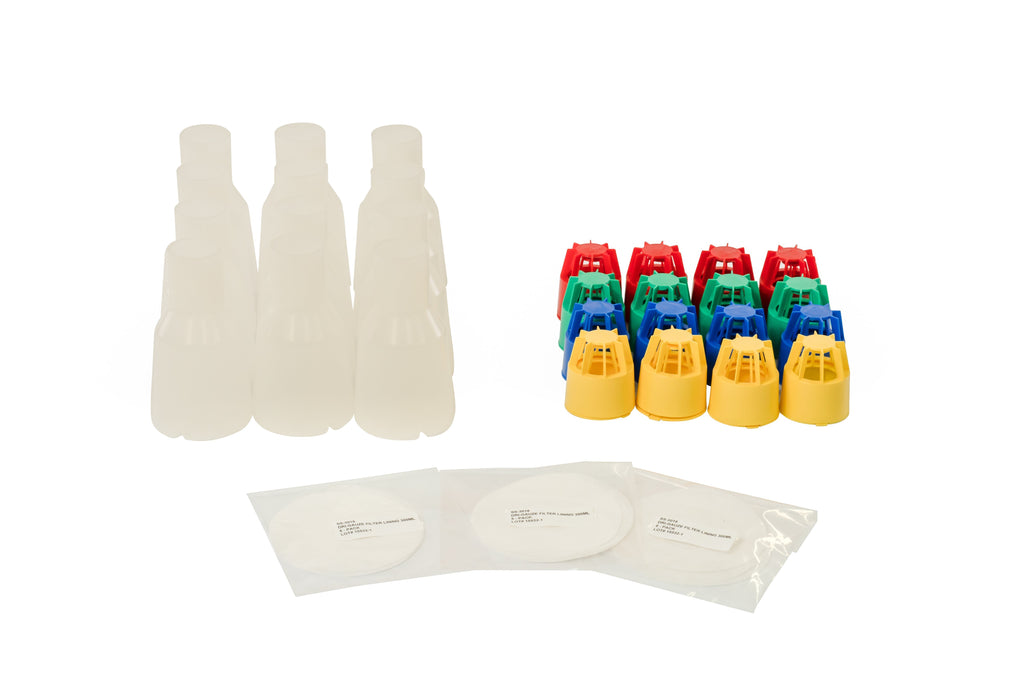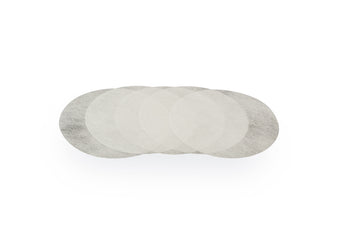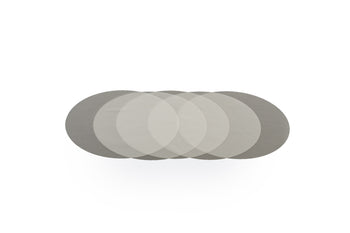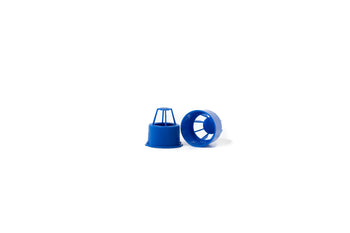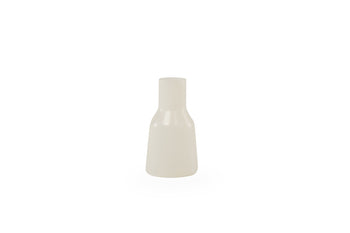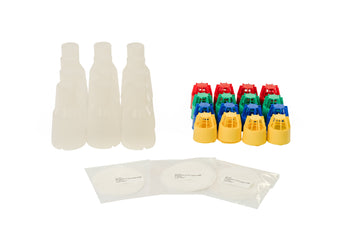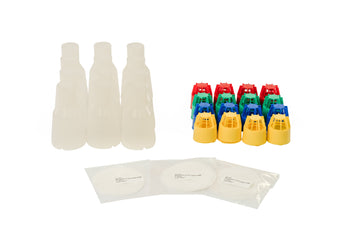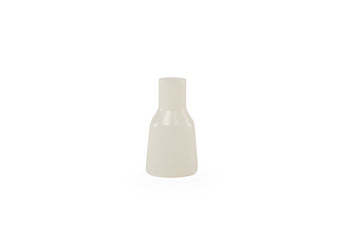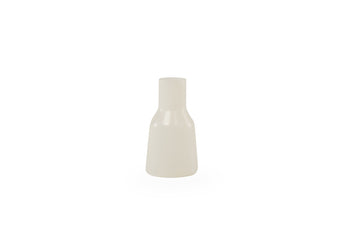
TUNAIR™ Polypropylene Erlenmeyer Flask Systems: Optimized for Superior Growth and Aeration
The TUNAIR™ Polypropylene Erlenmeyer Flask Systems by IBI Scientific are an innovative and patented solution designed to enhance the growth and productivity of microbial, mammalian, and plant cell cultures. Engineered specifically for microbiology and biotechnology applications, these flasks outperform traditional Erlenmeyer flasks by offering superior oxygen absorption rates, efficient aeration, and optimal mixing. Whether used in academic research, industrial bioprocessing, or pharmaceutical production, TUNAIR™ flasks provide an exceptional environment for aerobic cultures, ensuring higher cell yields and improved growth conditions.
Optimized Oxygen Transfer and Aeration
One of the standout features of TUNAIR™ Erlenmeyer Flask Systems is their high oxygen absorption capability, achieved through an innovative baffling and turbo-vane closure design. The Full-Baffle Shake Flask, with a working volume of 100 ml, is equipped with six baffles, creating a propeller motion that promotes efficient mixing and aeration. This specialized design enhances oxygen transfer rates, ensuring that cultures receive an adequate supply of dissolved oxygen, which is crucial for cell growth and metabolic activity.
Durable, Reusable, and Autoclavable Components
Designed for long-term use and easy maintenance, the TUNAIR™ flask system includes high-quality components that can withstand repeated sterilization and usage cycles:
- Dri-Gauze Filters: Constructed of 0.22-micron nitrocellulose, these high-efficiency filters can be used 10 to 12 times and are fully autoclavable within the cap assembly. These filters ensure that cultures remain free from contamination while maintaining superior aeration.
- Two-Piece Cap Assemblies: Made from solvent-resistant polypropylene, these durable caps allow for easy filter replacement and can be autoclaved before reuse, making them ideal for maintaining sterile conditions.
- Comprehensive Flask Set: Each kit includes twelve (12) 300 ml Full-Baffle TUNAIR™ Shake Flasks, twelve (12) two-piece caps, and fifteen (15) Dri-Gauze filters, providing a complete laboratory solution.
Simple Maintenance and Filter Replacement
Ensuring sterility and optimal performance is effortless with TUNAIR™ systems. The filter replacement process is designed for user convenience:
- Pinch the flanges of the inner-closure shell until they snap loose.
- Remove the used filter lining and discard it properly.
- Insert a new Dri-Gauze filter lining between the two cap components.
- Snap the cap back together, ensuring the inner flanges lock securely into the grooves of the outer shell.
To clean the flasks and caps, simply soak them in water with a mild detergent solution to remove dirt and contaminants. Once cleaned, air-dry all components before autoclaving for complete sterilization.
Key Benefits of TUNAIR™ Erlenmeyer Flask Systems
- Enhanced Oxygen Absorption: The advanced baffling and turbo-vane closure design increase oxygen availability, promoting efficient cell growth.
- Superior Mixing and Aeration: The six-baffle system creates a propeller motion, ensuring homogeneous mixing and efficient oxygen distribution.
- Cost-Effective and Reusable: The autoclavable filters and caps allow for multiple reuse cycles, reducing overall laboratory costs.
- Solvent-Resistant and Durable Construction: Made from high-quality polypropylene, ensuring compatibility with bioprocessing solvents.
- Effortless Filter Replacement: The snap-in system allows for quick and hassle-free filter changes, minimizing laboratory downtime.
- Complete Lab Solution: The set of 12 flasks, 12 two-piece caps, and 15 Dri-Gauze filters provides an all-in-one culture system.
Ideal Applications for TUNAIR™ Flask Systems
These advanced shake flasks are perfect for various scientific and industrial applications, including:
- Microbial Fermentation: Ideal for yeast, bacteria, and fungal cultures, where high oxygen demand is essential.
- Mammalian and Plant Cell Cultures: Supports delicate cell lines, ensuring high viability and productivity.
- Biopharmaceutical Research: Used for vaccine development, protein expression, and monoclonal antibody production.
- Academic and Industrial Biotechnology Labs: Suitable for R&D, pilot-scale, and large-scale production.
Why Choose TUNAIR™ Over Traditional Erlenmeyer Flasks?
Compared to conventional Erlenmeyer flasks, TUNAIR™ offers notable advantages, including:
- Higher Oxygen Transfer Efficiency: Traditional flasks lack the baffling and turbo-vane closure design, which enhances dissolved oxygen levels.
- Reduced Contamination Risk: The 0.22-micron Dri-Gauze filters provide superior filtration, maintaining sterile culture conditions.
- More Effective Mixing: The six-baffle design ensures even distribution of nutrients and oxygen, leading to faster culture growth.
- Extended Usability: Unlike standard flasks that require frequent replacement, TUNAIR™ components are built for durability and repeated sterilization.
Upgrade Your Lab with TUNAIR™ Erlenmeyer Flask Systems
For researchers seeking maximum cell culture productivity, improved oxygenation, and sterility maintenance, the TUNAIR™ Polypropylene Erlenmeyer Flask System is the ultimate solution. With its patented design, robust construction, and user-friendly maintenance, TUNAIR™ flasks are the preferred choice for biotechnology labs, pharmaceutical companies, and academic researchers worldwide.
Order Your TUNAIR™ Flask System Today!
Enhance your microbial, mammalian, or plant cell cultures with the TUNAIR™ Polypropylene Erlenmeyer Flask System. Contact IBI Scientific for more details on pricing, bulk orders, and customization options. Optimize your lab operations and culture growth with TUNAIR™ today!
- Specifications
- Technical Information
Flask Dimensions:
Flask Size: 300 ml
Working Volume: 100 ml
Base Diameter: 3.25” [8.25 cm]
Neck Diameter: 1.75” [4.45 cm]
Height: 6.00” [15.24 cm]
Height With Cap in Place = 7.25"
Weight: 0.01 lbs. [0.004 Kg]
Mixing:
Full-Baffle (6 Baffles): Propeller Motion
Shaker Speed:
1” Throws: 300-400 rpm or possibly higher
2” Throws: 150-200 rpm or possibly higher
Material:
All TUNAIR flasks and caps are constructed of chemical resistant polypropylene. All flasks and caps are fully autoclavable.
300 ml flask:
Allows for approx. 150 ml (max) of working volume for culturing cells
2.5 Liter flask:
Allows for approx. 1 liter (max) of working volume for culturing cells
Full-Baffle:
The bottom inside of the flask has 6 raised baffles. This configuration will generate 4 small propeller vortexes within the media inside the flask when fastened to an orbital shaker. The full-baffle configuration allows for slower operational rpm of the shaker while maintaining the vortexes within the media. The full-baffle flask is ideal for growing E.coli providing superior growth rates and cell densities. The 300 ml flask and 2.5 L flask both have a special cap and filter system that promotes gas exchange and maintains sterility of the growth culture during use. The inner portion of the cap unsnaps from the outer portion by pushing in the tabs on the side of the cap assembly and then pulling the insert out.
0.2-micron filters:
There are two different types of 0.2-micron filters available for the TUNAIR flasks. These filters allow for maximum gas exchange while maintaining sterility.
Dri-Gauze – This is a paper filter than can be used approx. 6 to 8 times before having to be replaced. This filter can be autoclaved while in the cap, on the flask, for 6 to 8 times.
Silicone – This is a silicone filter that will last the life of the flask. This filter can be autoclaved while in the cap and on the flask for many times.
Cap & Filter Assembly:
Once you have the 2-piece cap assembly apart (either the 300 ml cap or the 2.5 L cap) place the corresponding filter size inside the cap and the re-assemble the inner and outer cap pieces making certain to align the tabs with their associated holes. Once clipped into place, make certain the filter completely covers the cap assembly openings.
Attaching the flasks to your shaker:
IBI TUNAIR flasks can be used with nearly all standard shakers and shaker clamps. The 2.5-liter flask typically fits best into the 2-liter shaker clamp. The 300 ml flask typically fits best in the 250 ml shaker clamp.
Preparing and Cleaning the TUNAIR flask:
Your TUNAIR flasks are constructed of polypropylene plastic which allows them to be autoclaved. Once you have prepared your media inside the flask you can place the cap & filter on the flask and insert into the autoclave. Set the autoclave for wet cycle.
Once you have harvested your cells, wash the TUNAIR flask in a mild dish soap such as Dove Dish Soap then rinse well with DI water. Do NOT rinse the Dri-Gauze filter between uses. The silicone filter can also be rinsed with DI water if needed. Observe the condition of the filters between runs to make certain there are no holes or tears in the filter. If there are, replace the filter immediately.
Cell Growth Evaluation of Commonly Used Shake Flasks:
TUNAIR™ flasks were compared to conventional flasks using four different types of microorganisms: Escherichia coli, Saccharomyces cerevisiae, Penicillium avellaneum, and Streptomyces chartreusis. The aeration capacities of the shake flasks were determined by the sulfate oxidation method, and the values shown below are presented as oxygen absorption rate (OAR) in mM oxygen/L/Min. The growth rates of E.coli and S.cerevisiaewere expressed as optical densities (OD) at 555 mM. For S.chartreusis and P.avellaneum growth rates were evaluated by percent sedimentation. For E.coli and S.cerevisiae, the growth rates were determined after an 18-hour incubation period; for S.charteusis, a 24-hour incubation period; and for P.avellaneum, a 72-hour incubation period. Growth and OAR evaluations were carried out with 3-9 replicates and statistically analyzed using Turkey’s w-procedure. See results below.
Growth Chart:
| OAR Value | OD @ 555 mM | % Sedimentation | |||
|---|---|---|---|---|---|
| Flask | mM O2/L/Min. | E.coli | S.cerevisiae | S.chartreusis | P.aveilaneum |
| TUNAIR™ Full-Baffle | 4.25 | 7.09 | 5.63 | 19.7 | 3.3 M |
| TUNAIR™ Half-Baffle | 1.22 | 5.36 | 5.57 | 27.73 | 30.50 P |
| Triple Indented Flasks | 2.47 | 5.97 | 5.31 | 19.20 | 9.50 MP |
| Unbaffled Erlenmeyer | 0.52 | 5.97 | 5.19 | 17.37 | 25.10 P |
Growth Morphology:
M, mycelial; P, pellet; MP, mixed mycelial. The mycelial growths mostly adhered to the walls of the flask, which accounted for the low overall sedimentation value.
Growth Comparison of Saccharomyces Cerevisiae in TUNAIR™ Polypropylene Erlenmeyer Flasks and Brand C Shake Flasks:
The experiment was done on a New Brunswick INNOVA 44 shaker incubator.
It was conducted at different speeds – 200 rpm & 300 rpm.
Strain: Saccharomyces Cerevisiae
Medium: YPD broth (Yeast Extract Peptone Dextrose)
Flasks: IBI TUNAIR™ 300 ml Flask and Brand C 250 ml Growth Flasks
Cell Analyzer: Vi-Cell XR
Experiment Chart:

In this experiment, standard volume--60 & 50 ml YPD--was used for TUNAIR™ and Brand C flasks, which is 20% capacity of the flasks. The flasks were incubated at 30°C at speeds of 200 rpm and 300 rpm for 28 hours. After taking viable cell counts, it was found that under low speed (200 rpm) both TUNAIR™ and Brand C flasks contained yeast cultures of higher cell densities when compared to the higher speed (300 rpm) cell culture flasks.
It was also noted that the TUNAIR™ flask had higher cell density at 200 rpm and 300 rpm when compared to the Brand C flask. Although these data indicate TUNAIR™ flasks support higher density cell growth, we expected that higher speed (rpm) should produce higher cell density due to the higher dissolved oxygen concentration and better dispersion of cells. This unexpected data might be due to frozen cell culture stock, which might take a longer time to adapt to the environment. More experiments are required and are being carried out at this time. The focus of these experiments will involve:
• Varying shaker speeds and varying volumes of medium in the TUNAIR™ and Brand C flasks
• Comparative studies between TUNAIR™ 2.5-L growth flasks and Brand C 2-L flasks
• Varying shaker speeds and varying volumes of medium in the larger TUNAIR (2.5 L) and larger Brand C (2 L) flasks
Reference Papers:
1. Method to Increase the Yield of Eukaryotic Membrane Protein Expression inSaccharomyces Cerevisiae
2. Optimisation of Recombinant Production of Active Human Cardiac SERCA2a ATPase

